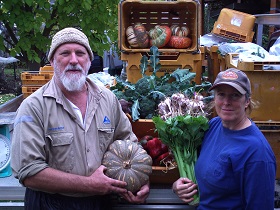Anton and Fiona Bombara are seasoned organic growers.
Critical skills
The Bombara's believe that observation and timing are the two most critical skills required in organic production.
“We learnt a lot empirically — making mistakes, observing the effects, applying what we considered to be the solution and then assessing the results."
"By observation we determined optimal planting and harvest times according to insect life cycles."
"We wanted to grow a variety of crops to get away from ‘one-crop’ farming," said Fiona.
Diversification allows Hamel Homegrown Organics to attract as many good insects as possible to their planting environment, as well as provide less risk in their business. As they grew more confident with the soil type and flood irrigation, they expanded their crops."
The Bombara’s grow some crops as the backbone of their production and add smaller crops to add variety for their roadside sales and farmers' market stalls.
During summer their main crops are rockmelon, tomatoes, corn and capsicum and they grow smaller amounts of zucchini, cucumber, pumpkin and watermelon.
During winter their main crops are beetroot, leeks and celery and they grow smaller amounts of broccoli, kale, lettuce, pak choy, peas, garlic and onions.
"We have done well with garlic, as consumers really want locally grown garlic. We harvest about 1.5 tonne of garlic each year.”

Prices
"The prices for our organic vegies varies in comparison to conventionally grown crops, sometimes they can be the same while others time there is a big difference.
"One thing is for sure we have more reliable returns for our produce — conventional farmers are more at the mercy of supply and demand."
"For example in the summer of 2010 the price of conventional rockmelons fell to as low as $6 a box while our lowest rockmelon price was $12 a box."
"Certainty in our prices allows us to plan with more accuracy for the year ahead."
"We know basically how much product the market will want during the year and sow with that in mind,” Fiona said.
The Bombara’s usually plant slightly less than they expect the market will want.
Knowing your market is very important.
Last words
Fiona said that when they started out in organics there was only limited information available.
"For people starting out in organics today I’d suggest their first point of call be NASAA — one of Australia’s leading certifiers and the Organic Growers Association of WA is also a great resource."
"Some work experience on an organic farm is essential for a would-be organic producer."
"Most of all, read as much as you can and talk with other producers," Fiona said.
Acknowledgment: Thanks to our friends at DAFWA - small landholder service for allowing the re-publishing of this article.



